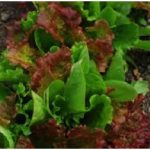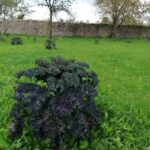Kale – Redbor F1
€2.95
Description
Kale – Redbor F1 is definitely the most beautiful vegetable in your garden and of course you can eat it as well. It has densely curled red leaves.
Sowing:
April to late June.
Sow one seed per module about 1.5cm deep and about 4 weeks later plant out.
Spacing:
Between rows: 60cm
Between plants in the row: 50cm
Approx. seed count: 20
Growing Kale – Redbor F1
Latin name:
Brassica oleracea Acephala Group
Family:
Brassicaceae (also known as Cruciferae)
Related to:
Cabbage, Brussels sprouts, kohlrabi, cauliflower, radish, turnip, swede.
Botanical classification:
Brassica derives from the Celtic bresic, the name for cabbage.
Oleracea means ‘as a herb’ – the wild cabbage. Acephala means ‘without a head’.
Introduction:
Kale – Redbor F1 is one of the hardiest winter vegetables and one of the easiest to grow. It seems to be much less plagued by all the brassica pests and diseases. I just wish we could like it more. Some varieties of kale, such as Redbor F1 and Nero di Toscana, are so attractive looking that they would deserve a prime place in your flower garden.
History:
The kale is the most similar plant to the wild ancestor of so many cultivated brassicas – Brassica oleracea – which still grows wild on the western coasts of Europe.
It was already grown in Roman times.
Soil and site:
Kale – Redbor F1 prefers a fertile, deep soil with high moisture retention. The soil should be free draining and kale will tolerate poorer soils than most brassicas. The ideal pH is 6.5-7.0.
Sowing:
Kale can either be raised in a seed bed as bare root transplants or in modular trays. If raised in modular trays it is essential that they are planted out before they become pot bound. I find that modular grown plants establish much easier. I sow one seed per cell 2cm deep.
Sow early varieties in mid April until early June.
Spacing:
Between plants: 60cm
Between rows: 50cm
Rotation:
It is absolutely essential to keep kale in the brassica section of your rotation to prevent a build up of the numerous brassica pests and diseases.
Plant care:
Apart from keeping the soil well hoed and weeded you should remove any discoloured lower leaves from the plant to improve the air-flow through the crop and thus minimise pests (aphids) and diseases (moulds).
Harvesting and storing:
Kale is such a forgiving plant. You could neglect it for months and still get many dinners out of it. Therefore, you should start harvesting the bottom leaves first and then you can take a good few each time but you should always leave the top 8 leaves to grow on.
Potential problems:
Kale – Redbor F1 is the easiest and healthiest brassica you can grow. It will suffer from all the common brassica problems but generally to a much lesser extent.
How much to grow?
If you eat kale regularly three plants are sufficient, if you want them for the occasional meal 1 or 2 plants will do.
For more information have a look at my monthly newsletters on:
https://greenvegetableseeds.com/newsletters/
For information on organic certification:
Have a look at the Irish Garden magazine:




